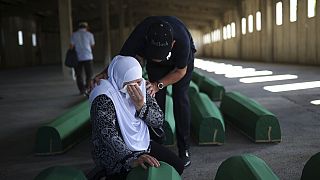Mothers of Srebrenica take centre stage at 27th anniversary ceremony

Among the rows of graves, it's easy to forget that the Srebrenica massacre took place only a generation ago.
More than 8,000 Muslim Bosnians were massacred within 10 days by Bosnian Serb troops under the command of General Ratko Mladic in the closing months of Bosnia’s 1992-95 fratricidal war.
The massacre is part of Europe's only acknowledged genocide since World War II.
Mladic’s soldiers threw the victims’ bodies into hastily made mass graves, and then later dug up the sites with bulldozers and scattered the remains among other burial sites to hide the evidence of their crimes.
But as soon as the war was over, mothers and other relatives of the victims vowed to find the remains of their loved ones, bring them back to their town and bury them there.
This year, an international conference -- the “Heroines of Srebrenica” -- was held at the massacre's memorial centre. The gathering focuses on how those women left behind found the strength to fight for justice after being driven from their homes and witnessing their loved ones being taken away to be killed.
"As the president of the Association 'Movement of Mothers of the Srebrenica and Zepa Enclaves, I wanted us to show that women are strong and bore the greatest burden, especially in the war," says Munira Subasic.
"We, the mothers of Srebrenica, bore the greatest burden during the war, after the war, and for 27 years we have been fighting for the truth, waiting for justice. We tried, in one way, to tie all the headscarves that we received from all over the world today, here in this place. By tying headscarves, we are saying that women must bind together.
"We have to show that we are the most important and that we have to, woman to woman, give a little more support in some way."
The Mothers of Srebrenica have pushed hard over the years for the mass graves to be uncovered, the remains identified and those responsible punished.
So far, the remains of more than 6,600 people have been found and buried at a cemetery in Srebrenica.
The remains of 50 more victims, recently found in mass graves and identified through DNA analysis, will be buried there on Monday.
The EU’s chief diplomat Josep Borrell and Commissioner for Enlargement Oliver Varhelyi have also spoken out on the anniversary of the Srebrenica massacre.
“Europe has not forgotten what happened in Srebrenica and our responsibility for not being able to prevent and stop the genocide," a statement read.
"In Srebrenica, Europe failed and we have faced our shame."
The two diplomats added that the war in Ukraine has brought back "vivid memories of those witnessed in the war in the Western Balkans in the 1990s".
"As we see the security and stability of Europe and the international rules-based order profoundly shaken, we are reminded of the need to stand up to defend peace, human dignity and universal values."

